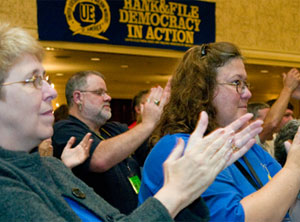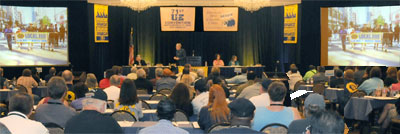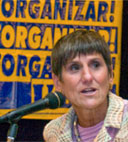 |
| Rank-and-File delegates from UE Locals across the country at the opening of the union's 71st National Convention. |
UE’s 71st National Convention got underway at 9:00 a.m., Sunday, September 13 at the Omni Hotel in New Haven, CT. UE Northeast Region President Peter Knowlton welcomed the delegates on behalf of the host region and recognized Marie Lausch, president of Connecticut’s statewide UE Local 222. He said that New Haven is the home to one of the union’s oldest locals, UE Local 243 at the lock manufacturer Sargent Manufacturing, as well as two of Local 222’s sub-locals representing city workers, Sub-local 68 in the Department of Public Works and Sub-local 71 in the Department of Parks and Recreation.
HISTORIC STRUGGLES
Knowlton read from a New York Times article published on Sept. 30, 1886. He said the clipping hangs on the wall at Local 243’s in-plant office at Sargent. It describes a strike by workers at Sargent over short workweeks. “This was the seed of resistance and organization that led to the formation 53 years later of UE Local 243, which this year celebrates its 70th anniversary,” adding that the Sargent workers’ union is now the largest manufacturing local in the region. “It is because of locals like 243 that our union survives and is still fighting like hell.”
Knowlton said he hoped delegates would get the chance to meet the Northeast Region’s oldest member, Joe Geraneo, who joined UE in 1937 and will turn 90 in a couple of months, yet remains active in the union he loves and fought for over so many years. “If you read or talk with UE retirees about what it was like to be attacked and red-baited and beaten up and demeaned during the dirty 1950s,” said Knowlton, “you come away with an unyielding admiration for these women and men who fought and resisted the wholesale assault on our union by GE, Westinghouse, and the government, the banks, the politicians, and the AFL and the CIO.” Knowlton said of these UE “ancestors,” “They lost a lot of battles but they won the war.”
BATTTLES AGAINST PLANT CLOSINGS
In the 1980s and ‘90s, Knowlton continued, UE members in New England fought many battles against plant closings in “the beginnings of massive deindustrialization in this country.” He said when you meet former UE members from now-closed factories today, they blame the boss, not the union for the closing and recognize that UE helped them to fight back.
He described an innovation developed in the mid-‘80s by UE members at two UE locals in New Bedford, first Local 277 members at Morse Cutting Tool and later Local 284 at JC Rhodes. They organized community support and demanded that the city seize the plant through its eminent domain powers to prevent the plant from closing. Morse workers succeeded in forcing the sale of their plant in this way, and gained several more years of work and wages. The JC Rhodes workers’ fight was unsuccessful in saving the plant because of the cowardice and betrayal of city officials at that time, but their struggle gained them a better severance agreement. “UE has always led the way in innovation,” said Knowlton. “Despite what their commercials say, GE can’t hold a candle to the innovation of UE members.”
Since the 1990s, UE in the Northeast has responded to the loss of manufacturing by organizing in other sectors. He noted that as many UE cutting tool shops in Vermont were shutting down, workers at the University of Vermont organized into UE, leading to successful organizing among service, non-profit and food workers in that state. The latest such group is Local 208 at the U.S. Customs and Immigration Service Center in St. Albans.
“It makes no difference whether we work in document processing, food co-ops, head start, custodial, food service or as a clerical worker. The bosses come in different flavors but they still taste as rotten as they do in a factory. You just got to do your best to chew them up, and spit them out.”
'HONEST, DEMOCRATIC, MILITANT RANK-AND-FILE UNION'
Finally, Knowlton talked about how the Connecticut Independent Labor Union/Connecticut Independent Police Union came into UE in 2005 and became Local 222. John Woodruff, then president of CILU/CIPU, sent UE an email that simply said “Help!” Woodruff had found UE on the internet, Knowlton said, “by using the following search terms: independent, rank and file, union.” This led to the affiliation. “From the very beginning these members clearly wanted an honest, transparent, democratic, militant rank-and-file union... The transition they’ve gone through has been nothing short of remarkable.”
“The problems of public workers are the same as those in manufacturing,” Knowlton concluded. “What the boss gets away with at Sargent, they try to get away with at New Haven Dept. of Public Works. We only promised members a fighting chance – if they were willing to fight. We never promised them a rose garden, but said if they persevered and lasted one day longer than the boss they could get bread, and roses too. They are rising to the occasion and our region, our union, is so much better for it.”
 |
| UE 71st National Convention |
Knowlton then introduced Local 243 President Ray Pompano. Pompano said it was a great honor for his local to host the UE Convention in their city of New Haven, especially in the year of Local 243’s 70th anniversary. He described the low wages and discriminatory treatment that led Sargent workers in the late 1930s to turn to UE, and how they gradually built the union by getting fellow workers to sign union cards when the boss wasn’t looking. He then called for the officers and elected stewards of Local 243 to come forward, and over 20 men and women, attired in blue and gold UE Local 243 jackets, marched to the front of the convention hall and onto the stage, as delegates stood and applauded.
Pompano said that as they left work on Friday, the company had hit the local leaders with a new “threat of layoffs, the biggest ever,” but added, “as long as there’s one union member alive, we’ll keep on fighting and kicking the boss’s ass.”
Pompano introduced Rev. David McClure, pastor of the New Life Worship Center and a Local 243 member, and wife Ruthie. Mrs. McClure sang a beautiful rendition of “The Star Spangled Banner,” and Rev. McClure then delivered the invocation. As Solomon prayed for wisdom, he asked that the delegates be blessed with wisdom, and that the convention would “continue to unify this union,” and that UE members “not shun one another, but love one another.”
Knowlton introduced Local 222 President Marie Lausch to the Convention. She welcomed New Haven’s Rabble Rousers, who performed three rousing union songs they had composed, accompanied by guitar and banjo: “New Haven’s a Union Town,” “Sit-Down Strike”, and “I Say Union.” Delegates clapped and sang along, and thanked the performers with a standing ovation.
DELAURO: 'HEALTHCARE REFORM IS AN URGENT NECESSITY'
Knowlton then gave the podium to UE General President John Hovis to introduce New Haven’s Congresswoman Rosa DeLauro (D), now in her 10th term. DeLauro expressed her appreciation for the opportunity to address the convention and acknowledged UE’s progressive leadership, as well as her “good friend” Ray Pompano. She said that she was “raised in the house of labor.” Her grandfather, an immigrant from Italy, worked at Sargent by day and made pastries by night, which her grandmother sold. When DeLauro was a child, her mother took her to see the garment sweatshop where she worked so that she would understand hard work and those who do it. When she first ran for office, the initial support she received was from the unions, and her philosophy is that, “you stay with the people that brought you to the dance.”
She spoke passionately about the need to pass the Employee Free Choice Act to make organizing easier, and summarized the findings of a recent UCLA study of wage theft and exploitation of immigrant workers. “This would not happen if people had union representation,” the congresswoman said.
She also described passage of healthcare reform as an urgent necessity, pointing out that Anthem Blue Cross recently raised its premiums in Connecticut by 32 percent. The Republicans have made it clear that their top priority is to block any healthcare reform, she said, with one GOP senator saying they need to make healthcare Obama’s “Waterloo.” She said it is important that a public option be part of the healthcare bill, to compete with the private insurers and hold down costs. “No American should go broke just because they got sick.”
 |
| Rep. Rosa DeLauro |
DeLauro also spoke about the continuing fight for equal pay for women. Delegates applauded when she mentioned that she had voted against Bush’s invasion of Iraq, and she called for bringing the troops home by June 30. She also expressed her skepticism about the war in Afghanistan.
She closed by calling for organized labor to once again become “a force to be reckoned with” as in the 1930s, and thanked the delegates “for what you do.”
Delegates approved a motion naming Paul Kay of Local 222 as the convention’s sergeant-at-arms, and later approved the appointment of the Rules and Order Committee. Before the closing of the session, the committee reported back with proposed rules for the convention, which the delegates approved.
In his opening address to the delegates, President John Hovis began by quoting filmmaker Michael Moore’s 2003 book, Dude, Where’s My Country? Moore wrote “Not all unions are good, many of them are just plain lousy,” and named just two that he considered good – one of them being UE. A few months ago, the Nation magazine went further than Moore, naming UE the country's “most valuable union.”
'MOST VALUABLE UNION'
“What is it that sets us apart from most other unions?” Hovis asked. “What are the beliefs and policies that make UE different - where and how - did those practices get their start?” His explanation began with how UE was founded in 1937, by 17 independent local unions, and in particular by the principles they wrote into the union’s constitution. He led the delegates through a detailed examination of the UE Preamble, in which the founding members declared that they were forming “ ... an organization which unites all workers on an industrial basis, and rank and file control, regardless of craft, age, sex, nationality, race creed or political beliefs, and pursue at all times a policy of aggressive struggle to improve our conditions,” and “We pledge ourselves to labor unitedly for the principles herein set forth, to perpetuate our union and work concertedly with other labor organization to bring about a higher standard of living of all workers.”
Also of lasting importance, said Hovis, is another constitutional provision dating to 1936, Article 2, Section A, which spells out the mission of the union: “It shall be the object of the United Electrical, Radio and Machine Workers of America (UE) to protect, maintain, and advance the interests of working people, to organize local unions at places of employment, and to promote the advancement of such bodies.”
Hovis summarized the meaning of these provisions: “In short, we will work together and with other like-minded organizations to fight both the bosses and their political cronies to make sure every working person is shown the dignity they deserve and given the opportunity to wage a fight for a better life.”
Hovis emphasized the importance of the UE constitution’s provisions mandating membership, rather than staff, control of the union, and limiting officer and staff salaries to those of the higher-paid members. As one former officer put it, a union leader’s job is to get something for the members, not to get something from them. The building blocks of UE, even before its first convention, was department organization of workers on the job, and elected shop stewards, to enable them to fight grievances where they work. “That’s the history of the UE steward system and the policy of having one steward for every supervisor.”
The recent honors bestowed on UE – The Nation’s “most valuable union,” the “Inspiration to Labor Award” from United Students Against Sweatshops – “were largely due to the courageous act of local 1110 members who occupied their plant - collective action has long been a basic tactic used by UE members engaged in struggle.” Hovis asked the delegates to take a moment to recognize Local 1110’s contribution to UE’s tradition of struggle, and the entire convention stood and applauded.
UE’s principle of local autonomy “requires a certain amount of self-servicing,” said Hovis – locals taking care of their own basic business and not calling on the union staff to handle all their problems. Locals’ abilities to do this has been enhanced in the past two years by the union’s educational program, and he thanked Regional Presidents Carl Rosen, Andrew Dinkelaker and Peter Knowlton for organizing sub-regional meetings where leadership training has been very effectively carried out, and International Reps. Carol Lambiase and Dave Cohen who have developed many of the workshops.
The UE NEWS and UE website are also central to the union’s educational and informative missions, and Hovis noted the work of cartoonist Gary Huck, UE NEWS managing editor Al Hart, and UE webmaster Rick Peduzzi. Rick’s work brought the union another recent honor, “Labor Website of the Year,” voted by readers of the international labor site LabourStart.
'INTEGRITY AND RESPONSIBILITY'
Financial integrity and responsibility are also very important principles delineated in the UE Constitution. Locals as well as the national union are obligated to keep themselves in the financial health needed to fight for their members, and he reminded delegates that the late Jim Matles, former UE secretary-treasurer, used to say that “a union is only as strong as its finances allow it to be.”
“While perhaps not as severe as the great depression, the economic meltdown we face is the most severe in our lifetime,” said Hovis. Whether the economy is recovering “is a matter of debate” but what’s not debatable is that many families “are suffering personal hardship.” He said 16 million people are unemployed, and another 10 million underemployed. Manufacturing jobs have been disappearing for years. The foreclosure crisis “has reached an all-time high, with 2 million foreclosures this year alone.”
But times are good for the very banks and Wall Street investment firms which caused this crisis. He cited shocking illustrations: “According to a recent New York Attorney General’s report many bank executives annual bonuses actually exceeded their banks net income. Goldman Sachs, which earned $2.3 billion last year, while receiving $10 billion in bail out money, paid out $4.8 billion in bonuses in 2008 - more than double the bank’s net income. Morgan Stanley, which earned $1.7 billion last year and also received $10 billion in bailout funds, handed out $4.5 billion in bonuses - nearly three times the bank’s net income.”
KEEP UE 'VIBRANT AND GROWING'
Hovis briefly reviewed the union’s work in organizing, political action, and international solidarity. He commented on recent developments in both the Change to Win labor federation and the AFL-CIO. He reminded the delegates that we face many challenges, and closed with these words:
“Together we can keep UE vibrant and growing! The officers look forward to tackling our many challenges - working with all of you – building on UE’s rich history for many more years to come. We have a busy week ahead of us – so let’s get to work.”
Secretary-Treasurer Bruce Klipple then read the appointments of delegates to the Convention’s other standing committees: Resolutions, Constitution, Organizing, Publicity and Education, and Policy Education. The convention session recessed, and the entire delegation posed for the official convention photo. Through the afternoon and into the evening, the five committees met and prepared resolutions, reports and constitutional amendments to be considered by the full convention later in the week.
